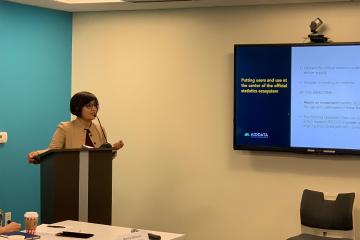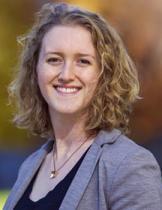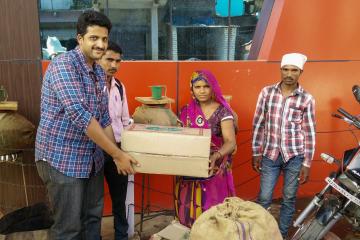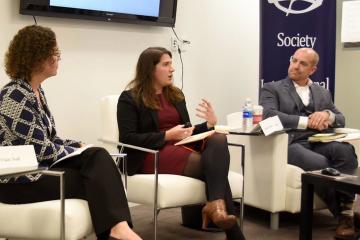
Kristen Watkins, J-PAL ’19, is helping shape upward mobility research in the United States

The Alumni Spotlight series highlights J-PAL alumni who are making an impact across industries and around the world. To nominate a J-PAL alum to be featured in a future Alumni Spotlight, please fill out this form.
In this installment of our Alumni Spotlight series, we caught up with Kristen Watkins, a former policy manager at J-PAL North America. Kristen joined J-PAL in 2017 to lead the Creating Moves to Opportunity project, an influential research partnership between J-PAL affiliated researchers and public housing authorities in the United States. Now the chief operating officer at Opportunity Insights, Kristen shares some reflections on her work at J-PAL and Opportunity Insights, and on how her background in city planning and the private sector informs her approach to social policy research.
What drew you to a career in social policy research?
I’ve been interested in poverty alleviation for a long time, but my studies and career have been a bit more varied than that. After finishing graduate school with a master’s in city planning, I started my career in the private sector, working on environmental sustainability projects. It was only when I joined J-PAL in 2017 that I got involved in poverty research in the United States.
A big reason for why I do what I do, both at J-PAL and Opportunity Insights (where I am now) is that upward mobility is personal. My dad’s father was in the Army and his family didn’t have a lot growing up. Despite that, he was able to go to college and in many ways achieve the ‘American dream’, which in turn gave me access to many opportunities that I wouldn’t have had otherwise. Opportunity Insights looks at why that story is becoming less common and how to improve the trajectories of people who are experiencing poverty. Beyond my own family’s story, I also believe there is just so much meaningful work to be done in this space, work that I get excited about doing every day.
Could you tell us about how your studies and city planning background shape your perspective on poverty alleviation?
I think it gave me a different perspective that has been quite helpful to me both at J-PAL and Opportunity Insights. City planning is a pretty interdisciplinary field, one in which you get to interact with many different people and gain very practical skills. A lot of the work that I did during my studies was out in the field, working with communities, learning about how different people come together to make decisions, and figuring out ways to help them have a say in decisions that will impact them.
It’s a different lens from a more traditional technical discipline such as economics or political science, one that is much more based in communities, people, and systems thinking. That background has been very helpful to me, especially as it seems like economics has pivoted to be a lot more thoughtful about those things.
I joined J-PAL North America because, after my stint in the private sector, I really wanted to get back to being more thoughtful and evidence-based in the decisions I was helping inform. After seeing decisions made based on evidence and data of varying levels of quality, I felt there had to be a better and more systematic way to do that. J-PAL felt like the right place to land in order to support people in making decisions with good research and evidence behind them.
Can you tell us a bit about your work on the Creating Moves to Opportunity (CMTO) project at J-PAL North America?
The Creating Moves to Opportunity (CMTO) project is a collaboration between a number of different housing authorities in the United States, an interdisciplinary research team, and a number of other stakeholders interested in housing mobility. The CMTO project was motivated by the original Moving to Opportunity research, which showed that the neighborhood where you grow up has a significant impact on your life trajectory. CMTO is interested in thinking about how housing authorities and housing programs in the United States more broadly can enable housing choice among their families and help kids grow up in better neighborhoods.
I came in probably a year and a half ago after the project had started, when we were gearing up to start a randomized evaluation in Seattle and King County, Washington. I acted as a project manager, coordinating across academics and the various partners on the ground, translating between the two groups as needed, and ensuring that everyone was on track and had the necessary information to make the project successful.
The project was quite ambitious from the start, ultimately aiming to make broader change to national housing policy. To that end, I also acted as an evidence hub for other interested changemakers, keeping around twenty other housing authorities up to speed on what we were learning in Seattle and apprised of other developments. There’s a lot of movement in this space!
Now you’re at Opportunity Insights, which is another organization involved with the CMTO project. What are you working on now?
I am the chief operating officer [COO] at Opportunity Insights. Opportunity Insights has a slightly different scope than J-PAL, focusing specifically on upward mobility among low-income people in the United States. As COO, I'm more involved in the bigger picture management of the organization. My role is about connecting the dots across everything that is happening, making sure that communication is happening across the team, setting up processes for how we do things, and handling broad organizational development.
Opportunity Insights is a pretty young organization, and because of that, there's a huge amount of opportunity to help shape what we're doing and how we're doing it. It’s an exciting time, and I'm really enjoying helping to chart a path forward. Having spent time at J-PAL thinking deeply about how to bring evidence to scale and what the challenges may be has been really helpful in this process, given that we wrestle with a lot of the same generalizability issues.
Do you have any advice for people who are interested in a career in poverty research, but come from backgrounds other than economics and public policy?
I’ve bounced around a lot, and through that, I’ve been able to gain a lot of different skills and tools that I can pull from. I spent four years working at a waste and recycling company in San Francisco, which was clearly very different from poverty research. But through that, I learned how to manage projects, how to work with many different people, and how to keep things moving when they're getting stuck in different political processes.
Even though it can be hard to see the thread that connects everything, the variety led me to develop a unique skill set that ultimately has been really helpful and enabled me to do a lot of the things I'm doing now. I would say that if something seems interesting and like a good learning opportunity, don’t be afraid to try it. Your path doesn’t have to be linear!




